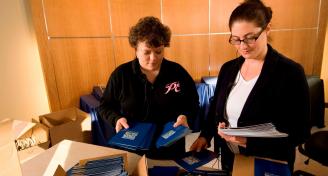Getting Clear on Repeat Events
Repeat events provide a great opportunity to step up your game and add more value.
But, there can be a downside to repeat events if you aren’t careful: it can be easy to make assumptions.
When working on a repeat event, it’s all too easy to rely on history and make decisions based on your previous experience because you really want to be focusing on some new wow factors and not reviewing AV specs for the 187th time.
We get it. We feel the same. The wow factors seem like such a better place to be spending time.
But you have to do both, and you have to do both well.
Get Clear With Your Stakeholder
Whether you are planning a brand new event (to you) or a repeat event, the first step must always be establishing clear expectations. This process tends to go faster for repeat events, but it is still essential to the overall success of the event.
When setting the expectations, you must review every element of the program and identify what stays and what needs to change. Just because you’ve always had a continental breakfast buffet doesn’t necessarily mean that your client may not want to try a full breakfast buffet next time. You have to ask the question.
What happens if you assumed the same AV setup was needed in breakout rooms because “it’s always been that way”? What happens when your client arrives on-site and asks where the new equipment is? Oh, your client never mentioned that they wanted a change? Well, you never asked if they wanted a change either.
It quickly becomes a stressful and chaotic situation that could have been handled months earlier with a simple question: “do you want to make a change to the equipment in the breakout rooms?” Client answers “yes, I’m so glad you brought that up and reminded me, I do want to change one of the rooms.”
See how easy that was?
Get Clear With Your Partners
Just like we can’t rely solely on experience, neither can our event partners. And, it’s our job to make sure we are setting clear expectations with them. It may seem tedious and they may be resistant to spending time reviewing what very well could end up being the exact the same plan, but it is critical to ensure that no one is making any assumptions.
Back to our AV example, what happens if your AV partner assumed that the same setup was needed in all of your breakout rooms and didn’t pick up that one room had a change? A careful review and discussion about all of the specs could have avoided that situation.
Your event partners are just as invested in the success of the event as you are, and it’s your job as the planner to ensure that they have the same level of clarity and information that you do.
Step It Up!
Once you’ve finished the process of reconfirming every detail and leaving nothing to be assumed, it’s time to step up your game! You have the benefit of previous experience with the event, you have clear expectations about what needs to happen for the next event, and now there is nothing standing in the way of adding value and wow factors into the process.





